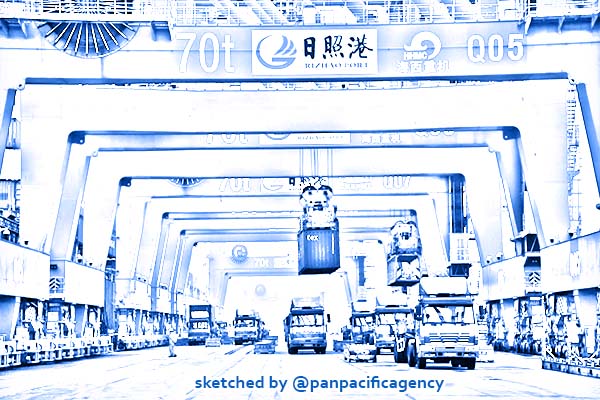[Analytics] Lessons from China’s economic recovery

Shipping container in China. China’s exports continued to fall in April, with an overseas demand shock hitting its economic recovery. Photo: AP. Sketched by the Pan Pacific Agency.
China has this week become the first country to inch its way back to economic growth after the Covid-19 outbreak. Nigel Green specially for the Asia Times.
The world’s second-largest economy grew by 4.9% in the July-to-September quarter compared with a year ago, according to government statistics released on Monday.
The pace was more rapid than the 3.2% increase that the People’s Republic recorded in the second quarter, when it successfully avoided a pandemic-triggered recession, unlike most economies.
“The Chinese economy remains resilient with great potential. Continued recovery is anticipated, which will benefit the global recovery,” Yi Gang, governor of the People’s Bank of China, said on Sunday during a seminar hosted by the Group of Thirty. He added that China’s economy is expected to expand by around 2% this year.
Although some may dispute the Chinese government’s own figures, even the independent International Monetary Fund (IMF) also estimates that the country’s gross domestic product will grow by 1.9% for all of 2020.
There are plenty of analysts who will say China has been successful in rebooting its economy because it has more tools available.
That’s to say it has an authoritarian regime and surveillance state that had the resources and will to impose severe measures – including widespread lockdown and tracing protocols – that simply cannot be done in a democracy.
However, it is not the case that only in an authoritarian government can remarkable post-pandemic economic turnarounds be achieved. A case in point is New Zealand. Other examples include South Korea, Singapore and Australia.
So what are the lessons other nations can learn from these countries in order to get their economies back on the road to recovery?
There are, I believe, two equally important parts in answer to this question.
First is the necessity for cautious, considered and enforceable reopening rules to be established – including obligatory testing for the virus and contact tracing, mask-wearing, and social distancing. As we have seen in China and elsewhere, these measures will reduce community spread and therefore allow businesses to reopen and will kickstart consumer spending.
Indeed, one of the most encouraging features of China’s recovery is in retail sales, which were up 0.9% in the third quarter from a year ago, with a 3.3% jump in September alone.
These necessary – and we hope temporary – protocols have, generally, been taken as scientific fact and not an excuse for political debate in countries that are staging economic recoveries.
And second is government assistance in helping businesses of all sizes through financial support as well as the putting aside many billions of dollars for major infrastructure projects to fuel economic growth in the longer term.
The only major economy to experience a broad recovery is that of China. There’s an upward swing across most sectors including travel and hospitality, which have been badly damaged by the pandemic elsewhere.
Other countries should now look to the People’s Republic for ways they too can reboot their economies. The figures coming from Beijing and the IMF speak for themselves – and there’s no time to lose.
Nigel Green founded deVere Group in 2002 from a single office in Hong Kong after discovering a niche market for expatriates in the financial services sector. Since then, it has grown to become one of the largest independent financial advisory organizations in the world with offices and clients across the globe.